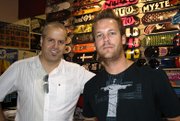Fashion Rides Into Surf Stores
Surf shops are shrines to the surf industry, dependably stocked with the latest boardshorts and skate T-shirts. Yet a handful of surf stores experimenting with selling clothes from fashion lines have been finding success.
While these stores have no plans to change their identities—they will always devote the majority of their floor space to surf and skate brands—they sell non-surf brands to keep their retail mix fresh and to stand out in an increasingly competitive market.
As with any experiment, this one creates opportunities and risks, said Roy Turner, president of the Wilmington, N.C.–based Board Retailers Association,
“You’re always looking for edge,” Turner said of surf retailers’ struggle to attract business with new fashions. “But it’s still in the back of everybody’s mind that we should stick to what we do best.”
Cliff Haddadin, chief executive officer of Anaheim, Calif.–based chain Beach Bums Board Shops, opted for the edge several years ago. In 2000, he noticed that surf style was trending toward fashion.
“The skater customer got more sophisticated,” Haddadin said. “He still wants to be different than the others.”
So Haddadin started selling the fashionable clothes skaters wanted from labels such as Diesel. The results are best seen at his store in The Block at Orange in Orange, Calif. Diesel is prominently featured in his window displays, and other non-surf brands—such as 7Diamonds, based in Santa Ana, Calif.—get real estate in the front of the store. Haddadin said fashion brands, which make up about 30 percent of the retail mix, attract customers to the store but surf and skate apparel still make up the core of his business.
“We’ll always be true to the core sports,” Haddadin said of the styles that remain his bread and butter. “We’ll be in it when surf and skate are not popular.”
Surf, however, has been incredibly popular during the past few years; it was a $4.14 billion industry in 2003, according to The NPD Group Inc., a market research company based in Port Washington, N.Y.
The popularity of surf is helping Beach Bums expand from eight to 10 stores by the end of this year, but fashion has added more gravy to the company’s profits, according to Haddadin, who declined to state just how profitable the company is.
Another chain mixing non-surf fashion with surf and skate is Active Ride, a 10-store company based in Ontario, Calif. By the end of the year, the company expects to have 12 stores, from Burbank to Riverside, Calif. Active Ride’s mix of fashion brands, such as Ben Sherman, with fashion-forward brands with roots in surf and skate—such as RVCA, Ambiguous Clothing and Obey—has made the company a sought-after tenant, said Shaheen Sadeghi, owner of The CAMP specialty shopping center in Costa Mesa, Calif.
“They’re in the forefront,” Sadeghi said of Active Ride. “They’re not afraid to try new brands. What gives them the added edge or value is the fact they early on recognized the importance of blending in fashion product with surf, skate and snow. This is how the customer is dressing. They might wear a Seven [for All Mankind] jean with a RVCA top.”
Turner of the Board Retailers Association said fashion has also become a bulwark against competition from discounters such as Target Corp., which sells surf mainstays such as boardshorts and walking shorts. “If you lose a segment of market, you get creative, and price and fashion go hand in hand,” he said.
Central Coast Surfboards in San Luis Obispo, Calif., 198 miles north of Los Angeles, devotes 10 percent to 15 percent of its apparel mix to non-surf brands, said Steve Carlson, general manager of the 29-year-old store. This attention to fashion apparel gives the store a competitive upper hand, according to Carlson.
“It was not meant as frosting on cake,” Carlson said of the non-surf products. “It was broadening the spectrum of what we have to offer.”
Carrying brands from Custo Barcelona to Von Dutch attracts business from students of California Polytechnic State University, San Luis Obispo and from the locals, he said.
Surf shops and non-surf brands are not always a perfect match, however. Ben Sherman sales representative Cindy Giffin said her current goal is to get Ben Sherman into boutiques, not surf shops. She feels keeping the two separate is important.
“The guy who only shops at Fred Segal is very concerned about his image,” she said. “If he spends $100 on a Diesel jacket, he doesn’t want to see his jacket sitting in a surf store, hanging next to a skateboard.”
This year, Milo Myers chose to get rid of all non-surf brands at his shop, Hangar 94, based in La Mesa, Calif. He said his decision had nothing to do with money and he has not experienced a decline in sales.
“It was an ethics decision,” Myers said. “We were confusing the customer. We are a traditional surf, skate, snow and motocross store.”






















